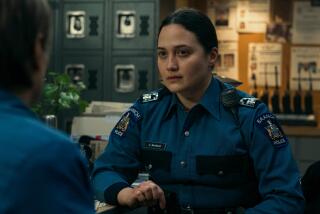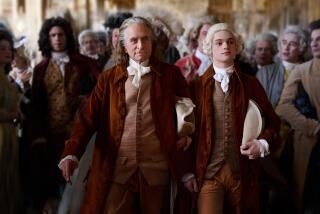Review: Fictional but familiar sex scandal roils Hulu’s moody new drama, ‘National Treasure’
In the British import “National Treasure,” premiering Wednesday on Hulu, Robbie Coltrane plays Paul Finchley, formerly half of a highly successful comedy team with Karl Jenkins (Tim McInnerny). Jenkins has become more successful since their split — the four-part series begins with Finchley presenting him with a lifetime achievement award — while Finchley hosts a daytime quiz show.
One day there is a knock on Finchley’s door. It’s the police, come to arrest him on suspicion of rape, a supposed incident from more than 20 years before.
American viewers may think of Bill Cosby. Audiences in Britain will recognize the affair of television personality Jimmy Savile, posthumously accused of the sexual abuse of hundreds of young people of both sexes. Its official aftermath, Operation Yewtree, extended the investigation of “historical sex offences” to other parties, many connected with show business and the BBC. Innocent people were arrested along with guilty ones. (“Everybody knew he was dodgy,” Finchley says of Savile, maintaining his own innocence.)
One watches the series through a filter of one’s own prejudices and assumptions about presumed guilt and innocence and, to some extent, one’s feelings about Coltrane, beloved around the world as Hagrid of “Harry Potter” fame. Whether Finchley will prove victim or villain — whether this is the story of a man whose sins have caught up with him or of a flawed person innocent at least of the charges at hand — is something the viewer is left to wonder alongside Paul’s family and friends. (Coltrane is also known for the crime series “Cracker,” in which he played a character darker than Hogwarts’ gentle gamekeeper.)
And so we have a kind of meta-mystery that will only be resolved by seeing the series through to the end, and perhaps not even then. (I am not telling.) As other women come forth to accuse Paul, his lawyer says “they could be fame seekers, they could be money seekers, they could have convinced themselves it’s true, it could be true.”
That the first episode sticks closely to Finchley seems to argue against his guilt — why spend time getting to know a character who will prove to be a monster? — even as the series itself seems to argue for it. It would be odd at this moment, when victims of abuse still fight to be taken seriously, to make this a story, at the end of four hours, one of false accusations and overzealous prosecution. You may be reminded too of a certain tape of a certain future president regarding just what stars can do with impunity.
But in the second hour, as we move on to spend time with wife Marie (Julie Walters) and daughter Dee (Andrea Riseborough), a troubled soul currently living in a halfway house, the story becomes more one of what binds a dysfunctional family together and how far that binding can be stretched before it snaps. It is not, hot-button subject notwithstanding, an “issue” drama.
Quite apart from its subject matter, a thoughtful script by Jack Thorne (“The Last Panthers”) offers rich parts to Coltrane, Walters and McInnerny, actors of an age that television does not always make the focus of its storytelling. All dig in, as does Riseborough, representing the younger generation at 35.
Coltrane, absent from the screen for several years and walking now with a cane (as he does in life), draws a portrait of diminished strength whose old power remains in a luxurious, wall-rattling baritone. Walters, another “Potter” star — she played Mrs. Weasley — and a much-honored treasure herself, mixes faith, regret, hope, suspicion and self-protection in varying degrees as Marie’s life comes to seem one thing and then another.
The naturalism of the writing wars somewhat with the high style of the direction (by Marc Munden, “The Crimson Petal and the White”), Ole Bratt Birkeland’s creamy, shallow-focus photography and a disturbing score (by Cristobal Tapia de Veer) that switches between a sort of Javanese electronica and something suggestive of the wind singing through empty lives.
“National Treasure” can feel moody to a fault, and there are times, as in the climactic courtroom scenes, when the drama gets a little … dramatic. (Attorneys who should object keep mum for the sake of the monologue.) But it also does capture an awful sense of isolation in close quarters, the sadness of lives that never quite align. And there’s plenty to chew on from beginning to the end.
‘National Treasure’
Where: Hulu
When: Anytime, starting Wednesday
Rating: TV-14 (may be unsuitable for children under the age of 14 with an advisory for suggestive dialogue)
Follow Robert Lloyd on Twitter @LATimesTVLloyd
ALSO
The Hollow Crown’ on PBS a princely Shakespearean treasure
The psychologist who just unloads
Romola Garai lifts ‘The Crimson Petal and the White’
More to Read
The complete guide to home viewing
Get Screen Gab for everything about the TV shows and streaming movies everyone’s talking about.
You may occasionally receive promotional content from the Los Angeles Times.







